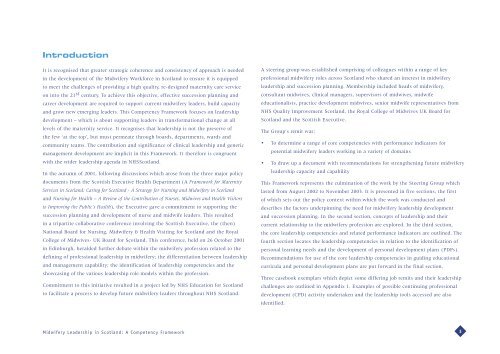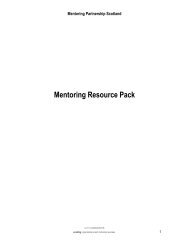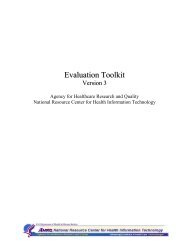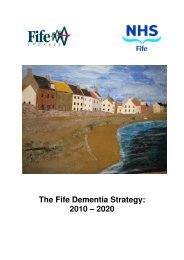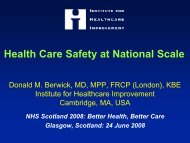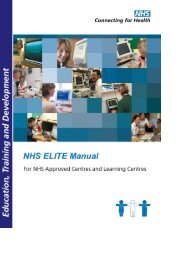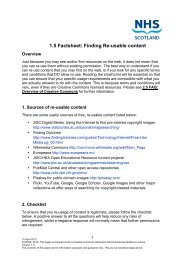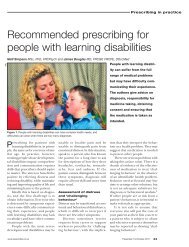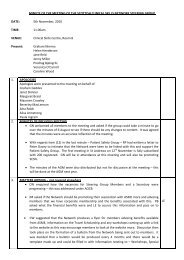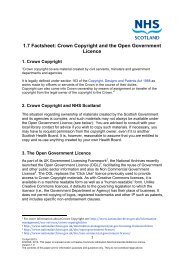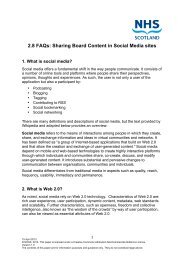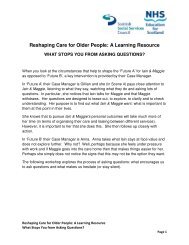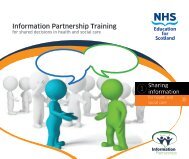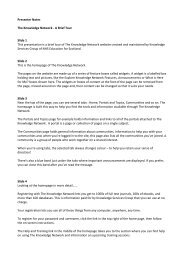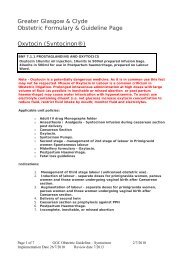Midwifery Leadership - The Knowledge Network
Midwifery Leadership - The Knowledge Network
Midwifery Leadership - The Knowledge Network
Create successful ePaper yourself
Turn your PDF publications into a flip-book with our unique Google optimized e-Paper software.
Introduction<br />
It is recognised that greater strategic coherence and consistency of approach is needed<br />
in the development of the <strong>Midwifery</strong> Workforce in Scotland to ensure it is equipped<br />
to meet the challenges of providing a high quality, re-designed maternity care service<br />
on into the 21 st century. To achieve this objective, effective succession planning and<br />
career development are required to support current midwifery leaders, build capacity<br />
and grow new emerging leaders. This Competency Framework focuses on leadership<br />
development – which is about supporting leaders in transformational change at all<br />
levels of the maternity service. It recognises that leadership is not the preserve of<br />
the few ‘at the top’, but must permeate through boards, departments, wards and<br />
community teams. <strong>The</strong> contribution and significance of clinical leadership and generic<br />
management development are implicit in this Framework. It therefore is congruent<br />
with the wider leadership agenda in NHSScotland.<br />
In the autumn of 2001, following discussions which arose from the three major policy<br />
documents from the Scottish Executive Health Department (A Framework for Maternity<br />
Services in Scotland; Caring for Scotland - A Strategy for Nursing and <strong>Midwifery</strong> in Scotland<br />
and Nursing for Health – A Review of the Contribution of Nurses, Midwives and Health Visitors<br />
to Improving the Public’s Health), the Executive gave a commitment to supporting the<br />
succession planning and development of nurse and midwife leaders. This resulted<br />
in a tripartite collaborative conference involving the Scottish Executive, the (then)<br />
National Board for Nursing, <strong>Midwifery</strong> & Health Visiting for Scotland and the Royal<br />
College of Midwives- UK Board for Scotland. This conference, held on 26 October 2001<br />
in Edinburgh, heralded further debate within the midwifery profession related to the<br />
defining of professional leadership in midwifery; the differentiation between leadership<br />
and management capability; the identification of leadership competencies and the<br />
showcasing of the various leadership role models within the profession.<br />
Commitment to this initiative resulted in a project led by NHS Education for Scotland<br />
to facilitate a process to develop future midwifery leaders throughout NHS Scotland.<br />
A steering group was established comprising of colleagues within a range of key<br />
professional midwifery roles across Scotland who shared an interest in midwifery<br />
leadership and succession planning. Membership included heads of midwifery,<br />
consultant midwives, clinical managers, supervisors of midwives, midwife<br />
educationalists, practice development midwives, senior midwife representatives from<br />
NHS Quality Improvement Scotland, the Royal College of Midwives UK Board for<br />
Scotland and the Scottish Executive.<br />
<strong>The</strong> Group’s remit was:<br />
• To determine a range of core competencies with performance indicators for<br />
potential midwifery leaders working in a variety of domains<br />
• To draw up a document with recommendations for strengthening future midwifery<br />
leadership capacity and capability<br />
This Framework represents the culmination of the work by the Steering Group which<br />
lasted from August 2002 to November 2003. It is presented in five sections, the first<br />
of which sets out the policy context within which the work was conducted and<br />
describes the factors underpinning the need for midwifery leadership development<br />
and succession planning. In the second section, concepts of leadership and their<br />
current relationship to the midwifery profession are explored. In the third section,<br />
the core leadership competencies and related performance indicators are outlined. <strong>The</strong><br />
fourth section locates the leadership competencies in relation to the identification of<br />
personal learning needs and the development of personal development plans (PDPs).<br />
Recommendations for use of the core leadership competencies in guiding educational<br />
curricula and personal development plans are put forward in the final section.<br />
Three casebook exemplars which depict some differing job remits and their leadership<br />
challenges are outlined in Appendix 1. Examples of possible continuing professional<br />
development (CPD) activity undertaken and the leadership tools accessed are also<br />
identified.<br />
<strong>Midwifery</strong> <strong>Leadership</strong> in Scotland: A Competency Framework<br />
3


